Social Democratic Party of Germany
![]()
SPD is a redirect to this article. For other meanings, see SPD (disambiguation).
The Social Democratic Party of Germany (abbreviation: SPD) is a political party in Germany.
The first forerunners of the party were the General German Workers' Association, founded in 1863, and the Social Democratic Workers' Party, founded in 1869, which merged in 1875 to form the Socialist Workers' Party of Germany. The party gave itself its present name in 1890, and is considered the oldest party still in existence in Germany. From 1890 to 1930 it was always the party with the largest number of votes in all Reichstag elections and in the Weimar Republic, with Friedrich Ebert, it provided the first republican head of state in German history.
During the National Socialist dictatorship, the SPD was banned and was re-established in October 1945. In the Soviet occupation zone, the SPD there was forcibly united with the KPD to form the SED. In West Germany, and thus later in the reunified republic, it was able to establish itself as one of two large people's parties. It was involved in the federal government from 1966 to 1982, from 1998 to 2009 and is again since 2013 and provided with Willy Brandt, Helmut Schmidt and Gerhard Schröder three of the eight Chancellors.
Despite heavy losses since 1990, the SPD remains the largest party in Germany, ahead of the CDU, with around 420,000 members. In the 2017 federal election, the SPD achieved its worst result since World War II, but due to the failure of the Jamaica negotiations, it continued the grand coalition with the Union parties (CDU/CSU) that has existed since 2013. It provides six of the fifteen federal ministers in Merkel IV's cabinet, including the vice chancellor in Olaf Scholz, who is also a candidate for chancellor in the 2021 federal election. Party leaders since 6 December 2019 are Saskia Esken and Norbert Walter-Borjans.
At the state level, it is the only party represented in all state parliaments with a parliamentary group. In ten Länder it is involved in government, in seven it provides the head of government. It forms coalition governments with Bündnis 90/Die Grünen (red-green coalition), the CDU (red-black coalition), the FDP (social-liberal coalition), the Left (red-red coalition) or several of the above parties (red-red-green coalition, traffic light coalition, Kenya coalition, black-red-yellow coalition).
The SPD sends sixteen members to the European Parliament, who belong to the S&D Group. At international level, it is a member of the Party of European Socialists (PES) and the Progressive Alliance. It also has observer status in the Socialist International (SI).
Profile
Tradition
The SPD sees "its roots in Judaism and Christianity, humanism and the Enlightenment, Marxist social analysis and the experiences of the workers' movement" and itself as a "left-wing people's party".
From 1950, the party's federal headquarters was located in a temporary building on the grounds of the Erich Ollenhauer House in Bonn, which was inaugurated in 1975 and replaced by the Willy Brandt House in Berlin as federal headquarters in 1999.
Principles
The SPD's self-image, which it also tries to pass on in its party programmes, includes a concentration on political content and long-term goals, which it does not want to give up in favour of a short-term personal effect. It understands its basic programme as a "moral justification for its policies".
The following policy statements were adopted:
- 1869 - Eisenach Programme of the Social Democratic Workers' Party (SDAP)
- 1875 - Gotha Programme: unification congress of the two workers' parties ADAV and SDAP
- 1891 - Erfurt Programme: mixture of Marxism and revisionism
- 1921 - Görlitz Programme: separation of SPD and USPD
- 1925 - Heidelberg Programme: demand for a United States of Europe
- 1959 - Godesberg Programme: Change from a workers' to a people's party
- 1989 - Berlin Programme: Environmental and Peace Policy
- 2007 - Hamburg Programme
Initially, the SPD was a socialist workers' party. Increasingly, it transformed itself into a social democratic people's party until the Godesberg Programme.
The current party programme of the SPD, the "Hamburg Programme", was adopted in 2007. It sets out the goal of governing with the help of the "solidary majority". Democratic socialism is described as "an order of economy, state and society in which the civil, political, social and economic basic rights are guaranteed for all people, all people can lead a life without exploitation, oppression and violence, i.e. in social and human security" as well as a "vision of a free, just and solidary society", the "realisation" of which is emphasised as a "permanent task". Social democracy" serves as the "principle of action".
According to the Hamburg Programme, freedom, justice and solidarity are the basic values of democratic socialism for the SPD. Thus, social justice is one of its primary political guiding values. The coordinated social market economy is to be strengthened, its returns thereby fairly distributed, as this is seen as necessary for the prosperity of the population as a whole. The SPD considers a strong state and an effective welfare state to be necessary in the future, too, in order to be able to protect weaker sections of the population. To this end, it attaches importance to a financial policy that is "not designed at the expense of future generations" and that ends or reduces public debt in the long term. Under the heading of a precautionary welfare state, it welcomes changes to the social system that are intended to strengthen individual responsibility and were implemented as part of Agenda 2010.
In terms of social policy, the SPD's programme advocates civil rights, the opening up of society and civic participation. In foreign policy, it wants to strengthen peace in the world by balancing interests. Globalisation is to be shaped "by a democratic policy". It seeks to broaden and deepen European unification.
Program
Foreign Policy
The SPD sees peacekeeping at the centre of its foreign policy. In doing so, it builds on dialogue and civil conflict resolution. It wants to safeguard human rights. In doing so, it sees itself as a partner of the West and NATO. The SPD is in favour of military operations by the Bundeswehr if diplomatic means have been used sufficiently and no solution has been reached. It rejects arms exports to dictatorships.
security and defence policy
Until recently, the SPD provided members of government who were oriented towards an active and pragmatic security and defence policy, such as the former Federal Defence Ministers Helmut Schmidt, Georg Leber, Hans Apel, Peter Struck, but despite its current participation in government, it is moving towards a pacifist basic stance on defence and alliance policy, clearly distancing itself from the Bundeswehr and NATO. The military and security policy views of the SPD parliamentary group leader Rolf Mützenich stand in sharp contrast to the Western-oriented, NATO-friendly stance of Foreign Minister Heiko Maas.
Education policy
The SPD sees education as the key to social participation and prosperity. The central goal is educational equity and the opportunity for children from educationally disadvantaged backgrounds to advance. The SPD is critical of the ban on cooperation between the federal and state governments. It sees the expansion of comprehensive schools as a way to make the education system more permeable. The SPD strictly rejects tuition fees and has abolished them in the federal states it governs, or has not introduced them at all. Early childhood education has a high priority within social democratic education policy. In particular, it wants to integrate children from migrant families into society.
Energy policy
The SPD rejects nuclear power. As a result, under the red-green federal government, it has decided on the energy turnaround and wants the change from limited available energy sources to inexhaustible and from pollutant to low-pollutant resources. Jobs in industry, crafts and service professions as well as in agriculture and forestry are to be created as a result. The SPD sees coal and gas-fired power plants as a bridge energy option to avoid further increases in energy costs. It thus stands for a climate-friendly energy policy that should be as cost-effective as possible. According to the SPD, the costs should be paid fairly by all.
European policy
The SPD sees itself as a progressive European party. European integration is to be advanced and national sovereignties are to be handed over to the European Union. The European Parliament should be strengthened in its rights, for example by the introduction of a right of proposal. The European Commission is to be developed into a real government. The direct election of the Commission President is supported. To avoid wage dumping, Europe-wide minimum standards should be introduced, depending on the respective member state. In the euro crisis, the SPD supports the rescue policy through the ESM and the fiscal pact, but at the same time wants targeted investments in the infrastructure and economy of the crisis countries in order to reduce unemployment.
Family policy
The SPD recognises and welcomes the change in the roles of men, women and the classical image of the family towards more flexible and individual life plans. Families should be supported in their individual plans in a more targeted way.
Among other things, it sees means in a higher relief contribution for single parents and in an expansion of the spousal splitting into a partner tariff that supports families regardless of the chosen life form. In addition, full equality for homosexual partners is to be achieved. Marriage for all and joint adoption rights for married same-sex couples were endorsed by the SPD in summer 2017.
Domestic policy
Domestic policy should respect and secure the freedom and security of citizens. Thus, the coexistence in society should be guaranteed by domestic policy. Crime should be fought and the security apparatuses should be expanded without touching civil rights. The integration of immigrants is welcomed. The state should guarantee participation and equal opportunities for immigrants. The SPD wants to achieve a culture of welcome. Educational qualifications acquired abroad should thus also be recognised in Germany, and dual citizenship should be granted. Asylum seekers are to be accepted by Germany and municipalities are to be supported more strongly by the federal government in their financial burden. Within the SPD, a points system is being discussed as an immigration law. Legal policy should promote a modern and tolerant society. To this end, for example, a legal women's quota should promote the emancipation of women. The SPD supports direct citizen participation in democracy and referendums, also at the federal level.
Social policy
Central within social democratic policy is labour and social policy. The welfare state should act preventively and support people in case of illness, disability or unemployment. In doing so, the SPD relies on the principle of "promote and demand", according to which recipients of unemployment benefits should enjoy financial security and, at the same time, be required to perform by having their benefits reduced if they are refused a job. People should be able to live from their work, which is why the SPD introduced a minimum wage of €8.50, which has since been raised to €9.19. Jobs are to be created and especially the long-term unemployed are to be reintegrated into the labour market. Rents should only be allowed to rise up to a certain level, which is why the SPD demands a rent brake.
Economic policy
The SPD stands for an economic policy that is about the common good and progress. Since the economic and financial crisis, the SPD has stood for regulation of the international financial markets in order to restore the primacy of politics over the economy. The German social market economy is to be expanded internationally. In doing so, "[s]o much competition as possible, as much regulating state as necessary" is demanded. Therefore, the democratic state must remain capable of acting. Ecological sustainability and a targeted reduction of debt are welcomed.
Refugee policy
The SPD wants to help refugees and offer them prospects. It is committed to creating legal migration routes for asylum seekers and to combating the causes of flight. Federal states and municipalities should be supported in the accommodation and care of refugees and asylum seekers. The SPD advocates controlled family reunification, including for those only entitled to subsidiary protection. In the EU Parliament, the SPD supports the extension of family reunification to adult and married siblings.
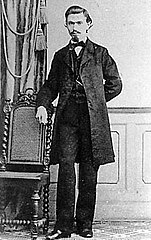
August Bebel (1863)
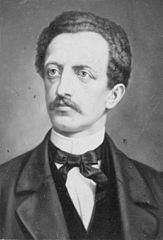
Ferdinand Lassalle (1860)
Organization
Structure
The members are organised in about 12,500 local associations, which hold regular general meetings and send delegates to the sub-district party congresses.
The 12,500 local associations are organised in 350 sub-districts, which regularly hold sub-district party congresses and send delegates to the state party congresses.
The 350 sub-districts are in turn organised into 20 districts, which regularly hold district party congresses, from which 600 delegates are sent to the federal party congress. If an SPD district is congruent with a federal state, it is called a state association. In federal states with several districts, the districts together form a state association. In addition, each district sends representatives to the party council.
In addition to this basic structure, there are some additional levels of organisation, which were mostly created for reasons of local political expediency, do not exist everywhere and in some cases have only limited rights (e.g. the right to make motions at party congresses or to manage the party's finances), for example, the sections below the level of the local association. These include, in particular, district associations as subdivisions of subdistricts which cover more than one district; however, the name "district association" is sometimes also used by subdistricts themselves if their structure corresponds exactly to a district. In Bavaria, Rhineland-Palatinate and North Rhine-Westphalia, below the level of the Land association, which in each case corresponds to the district in the sense used above, there are also so-called regions or (conceptually misleading) districts. In Rhineland-Palatinate and North Rhine-Westphalia these regions represent the old party districts which existed until they were merged into a state district. In Bavaria, the district associations correspond to the government districts, which there form an independent municipal body with the district assemblies.
Party conference
→ Main article: List of SPD party congresses
The Federal Party Congress is the supreme body of the party. It determines the basic lines of SPD policy, adopts the party programme, elects the party executive, the Control Commission and the Federal Arbitration Court. It also decides on the statute of organisation, the constitution of the SPD.
Party Executive Board
→ Main article: SPD party executive
The party executive committee conducts the official business between party congresses. It was last elected by the delegates at the ordinary Federal Party Congress in Berlin from 6 to 8 December 2019. The party executive committee, which consists of the two chairpersons, the deputy chairpersons, the secretary-general, the treasurer and the person responsible for the European Union, as well as other assessors elected from among the members of the executive committee, emerges from the party executive committee as the executive committee.
| Chair | Saskia Esken, Norbert Walter-Borjans |
| Deputy Chairmen | Klara Geywitz, Hubertus Heil, Kevin Kühnert, Serpil Midyatli, Anke Rehlinger |
| Secretary General | Lars Klingbeil |
| Treasurer | Dietmar Nietan |
| Responsible for the European Union | Udo Bullmann |
| Presidium members | Doris Ahnen, Katja Pähle |
| Assessor | Leni Breymaier, Martin Dulig, Michaela Engelmeier, Wiebke Esdar, Franziska Giffey, Kerstin Griese, Uli Grötsch, Gustav Horn, Oliver Kaczmarek, Heiko Maas, Bettina Martin, Matthias Miersch, Aydan Özoğuz, Boris Pistorius, Michael Roth, Sarah Ryglewski, Svenja Schulze, Dagmar Schmidt, Alexander Schweitzer, Andreas Stoch, Johanna Uekermann, Dietmar Woidke |
Data of the national associations
| State association | Chairman | Members | Members | Result of the last election of the state parliament | Result of the Bundestag election 2017 | SPD head of government | ||
|
| Baden-Württemberg |
| Andreas Stoch | 034.138 | 0,36 % | 11,0 % (2021) | 16,4 % | no |
|
| Bavaria |
| Natascha Kohnen | 058.296 | 0,52 % | 9,7 % (2018) | 15,3 % | no |
|
| Berlin |
| Franziska Giffey | 017.145 | 0,55 % | 21,6 % (2016) | 17,9 % | Michael Müller (Senate Müller II), since 2014 |
|
| Raed Saleh | |||||||
|
| Brandenburg |
| Dietmar Woidke | 005.995 | 0,27 % | 26,2 % (2019) | 17,6 % | Dietmar Woidke (Woidke III cabinet), since 2013 |
|
| Bremen |
| Reinhold Wetjen | 004.140 | 0,70 % | 24,9 % (2019) | 26,8 % | Andreas Bovenschulte (Senate Bovenschulte), since 2019 |
|
| Hamburg |
| Melanie Leonhard | 010.405 | 0,66 % | 39,2 % (2020) | 23,5 % | Peter Tschentscher (Senate Tschentscher I), since 2018 |
|
| Hesse |
| Nancy Faeser | 052.007 | 0,96 % | 19,8 % (2018) | 23,5 % | no |
|
| Mecklenburg-Western Pomerania |
| Manuela Schwesig | 002.721 | 0,19 % | 30,6 % (2016) | 15,1 % | Manuela Schwesig (Schwesig cabinet), since 2017 |
|
| Lower Saxony |
| Stephan Weil | 056.886 | 0,82 % | 36,9 % (2017) | 27,4 % | Stephan Weil (Cabinet Weil II), since 2013 |
|
| North Rhine-Westphalia |
| Thomas Kutschaty | 108.205 | 0,69 % | 31,2 % (2017) | 26,0 % | no |
|
| Rhineland-Palatinate |
| Roger Lewentz | 036.308 | 1,02 % | 35,7 % (2021) | 24,2 % | Malu Dreyer (Dreyer III cabinet), since 2013 |
|
| Saarland |
| Anke Rehlinger | 018.131 | 2,04 % | 29,6 % (2017) | 27,2 % | no |
|
| Saxony |
| Martin Dulig | 004.295 | 0,12 % | 7,7 % (2019) | 10,5 % | no |
|
| Saxony-Anhalt |
| Juliane Kleemann | 003.397 | 0,17 % | 10,6 % (2016) | 15,2 % | no |
|
| Andreas Schmidt | |||||||
|
| Schleswig-Holstein |
| Serpil Midyatli | 016.911 | 0,67 % | 27,2 % (2017) | 23,3 % | no |
|
| Thuringia |
| George Mayer | 003.726 | 0,20 % | 8,2 % (2019) | 13,2 % | no |
Federal Arbitration Commission
The Federal Arbitration Commission is the highest party arbitration court of the SPD. It has been formed to arbitrate and decide disputes of the SPD or its branches with individual members and disputes about the interpretation and application of the statutes (esp. organizational statutes, election regulations). They serve to safeguard inner-party democracy, to guarantee the membership rights of party members and to safeguard the order of the party.
Working groups
| Working groups (AG) in the SPD
|
The SPD has set up working groups for a number of target groups and subject areas; these have the right to submit motions to the party congresses of the SPD and work semi-autonomously. Every SPD member younger than 35 is automatically a member of the Jusos. All female members of the SPD belong to the ASF, and all SPD members older than 60 automatically belong to the AG 60 plus. Membership of all other working groups is not automatic or compulsory. In all working groups it is possible to become a full member without belonging to the SPD (so-called supporter membership).
Working groups and forums
For some topics and target groups there are working groups, forums and project groups in the SPD. There is the Working Group of Formerly Persecuted and Imprisoned Social Democrats, the Working Group of Christians in the SPD, the Working Group of Jewish Social Democrats and the Working Group of Muslim Social Democrats. These four organisations are organised in a similar way to the working groups (with a federal executive committee, federal conferences and regional sub-organisations), but do not have the same rights. An initiative to found a secular working group was rejected by the party executive in 2018.
The objective of the working groups is more internally oriented, they are to enable SPD members of certain target groups or in certain subject areas to cooperate; some of the working groups also appear externally. The forums, on the other hand, have the primary goal of expanding the SPD's networking with organizations in specific subject areas.
In contrast, the SPD's Economic Forum is not a party forum, but a registered association close to the SPD.
Equality
In order to increase the proportion of women in management positions, a gender quota of 40 % was introduced in 1988. This quota states that all executive boards and delegations must be filled by at least 40 % of each gender. Since there are considerably fewer women than men involved as members in the SPD - the proportion of women among the members is 32 % - this has the effect of disadvantaging men in internal party elections. For this reason, there is often talk of a "women's quota". The nomination of candidates for the Bundestag and the European Parliament is based on the "zipper procedure", in which women and men are nominated alternately.
Party newspaper
The SPD publishes the members' newspaper Vorwärts. Its publishing house is a wholly owned subsidiary of Deutsche Druck- und Verlagsgesellschaft. Vorwärts was founded in 1876 by Wilhelm Liebknecht and others, initially as a daily newspaper and later converted into a weekly magazine. Today it is published monthly.
Logo and colors
In terms of colour, the colour red, which characterises the party's logo and corporate design, is of paramount importance in the SPD's external communication. White, purple, dark red and cyan blue complement the colour scheme.
Party logos
· 
1930s
· 
Around 1946
· 
1969–1982
· 
since 1989
· 
Variant 2009-2011
Special logos
· ![]()
since federal party congress in December 2019: alternative logo with rose
· ![]()
Since December 2019: Logo with claim "Into the new era".
· 
for the 2021 federal election: logo with claim "Social policy for you."
Finance
Revenue
The total income of the SPD in 2014 was 161,826,665.18 euros. Its main sources of income include membership fees and government funding. Party donations are traditionally low for the SPD. The SPD has comparatively high income from corporate activity, shareholdings and from other assets.
| Income of the SPD in 2014 | EUR | Share |
| Membership fees | 49.984.619,90 | 030,89 % |
| Contributions from elected representatives and similar periodic contributions | 24.458.914,48 | 015,11 % |
| Donations from natural persons | 12.575.615,99 | 007,77 % |
| Donations from legal entities | 02.532.489,27 | 001,57 % |
| Income from corporate activities and investments | 02.134.003,78 | 001,32 % |
| Income from other assets | 07.706.715,27 | 004,76 % |
| Events, distribution of printed matter and publications and other revenue-generating activities | 12.791.866,48 | 007,91 % |
| State resources | 48.648.864,36 | 030,06 % |
| Other revenue | 00993.575,65 | 000,61 % |
| Total | ≈ 161.826.665 | 100 % |
Donate
Between 30 % and 40 % of the donation income from legal entities came from large donations of more than € 20,000 per donation. The largest donors (legal entities, summed donation amounts from 2000 to 2008, from 2007 only donations of €50,000 or more) included the following companies and associations:
- 1,371,143 € Daimler Chrysler AG
- 0 657,522 € BMW AG
- 0 638,393 € Allianz SE
- 0 365,820 € Porsche AG
- 0 302,115 € Association of the Chemical Industry e. V.
- 0 300,000 € Deutsche Bank AG
- 0 300,000 € E.ON AG
- 0 281,211 € B.TV Television GmbH & Co. KG
- 0 277,258 € Southwest metal
- 0 250,000 € Commerzbank AG
Assets
The party assets of the SPD amount to over 207 million euros (2014). This makes it the wealthiest party in Germany. Like the assets of most major parties, this has increased significantly in recent years.
Equity investments
The SPD is the only political party in Germany with major media holdings. Through the media holding company Deutsche Druck- und Verlagsgesellschaft (ddvg), the SPD holds stakes in more than 70 newspapers with a total circulation of more than 6 million copies and 12 million readers, including Neue Westfälische, which was acquired 100% in 2016. SPD holds a 65.67% stake in Öko-Test Holding AG. For its part, it is the sole owner of Öko-Test Verlag GmbH (Öko-Test magazine) and Öko-Test Media GmbH.
From May 2004 to 2006, ddvg held a 90 percent stake in the Frankfurter Rundschau; the newspaper was experiencing financial difficulties. The takeover was controversial; critics expressed fears that a buyer could influence reporting. In 2006, it sold 50% of the shares and one vote to the Cologne-based publishing group M. DuMont Schauberg.
The net income of ddvg amounted to EUR 15.5 million in 2008 and EUR 17.2 million in 2007, of which EUR 11.4 million was distributed to the SPD as shareholder.
The SPD also holds a stake in Konzentration GmbH via trustees, which in turn manages the SPD's real estate as trustee.
Members
The minimum age of 14 years and the commitment to the goals of the party are membership requirements. Germans who live permanently abroad and foreigners who live in Germany can also become members.
According to the April 2018 inventory, the SPD had 457,700 members. 54% of SPD members are older than 60, 8% are younger than 30. 68% of members are male, 32% female. 34% pensioners, 23% civil servants, 15% white-collar workers, 8% blue-collar workers, 5% unemployed, 5% housewives, 4% self-employed, 2% freelancers, 2% students, and 2% no information.
In terms of language, SPD members consistently address each other as "Duzen" and, since the 1990s, have also called each other by their first names. In addition, they regard and refer to each other as comrades. Members of the SPD are colloquially referred to as Sozis or (then often somewhat pejoratively) Sozen.
Membership development
Immediately after the end of the war, the SPD took over many members of socialist and social democratic exile and resistance organizations. At the first federal election in 1949 it already had around 750,000 members again, reaching a temporary peak of around 820,000 in 1951. In the course of the 1950s, this number fell and reached the level of about 590,000 in 1958.
Since the 1960s, the SPD's membership numbers recovered and exceeded one million for the first time in 1977. In the 1980s, the party lost members, but remained above the 900,000 mark. Briefly, the SPD saw a slight increase in membership as a result of German unification. Since 1990, the SPD has suffered drastic membership losses of more than half, leaving it with just over 419,300 in 2019. The weighting of the social origin of the members has - among other things as a result of demographic developments - shifted sharply since the end of the 1950s. Whereas until then mainly blue-collar and white-collar workers formed the majority of members, this shifted in favour of civil servants and pensioners in subsequent years.
Incompatibilities
Membership in one of the following organisations is or was incompatible with membership in the SPD:
- German Free Alliance
- fraternity
- German Democratic Cultural Association
- Mutual aid association of the members of the former Waffen-SS
- Young Socialist German Workers
- Church of Scientology
- Association of Persecutees of the Nazi Regime; this decision was rescinded on 25 October 2010.
A prohibition on cooperation exists with respect to the following organizations:
- German Communist Party and Free German Youth (Berlin)
- Committee for Peace, Disarmament and Cooperation
- Committees against occupational bans
In addition, as with most other parties in Germany, membership of a party, civic association or grouping competing in elections is not permitted.
Internal party currents
Internally, the SPD can be divided into more left-wing Social Democrats, who organize themselves in the Forum Democratic Left 21 and the Parliamentary Left, and moderate conservative Social Democrats, who have joined together in the Seeheimer Kreis. Most recently, a new generation has also joined forces with the Berlin Network, which opposes the traditionalist wing formation. While the moderate conservative Social Democrats support the reform course initiated by Gerhard Schröder almost unreservedly, the left-wing Social Democrats are fighting for a classic left-wing and welfare-state policy from which, in their view, the SPD has moved away in recent years, above all as a result of Agenda 2010 and a course perceived as too economically liberal.
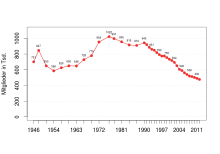
Membership development from 1946 to 2011
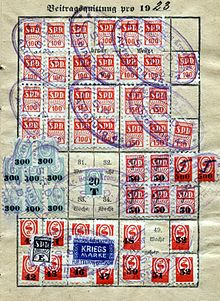
SPD contribution stamps from the year 1923
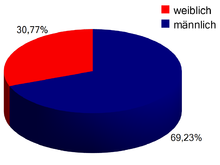
SPD members by gender, as of 2009
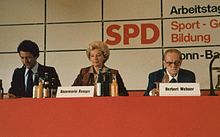
Joint meeting of various federal working groups (from left to right): Björn Engholm, Annemarie Renger and Herbert Wehner
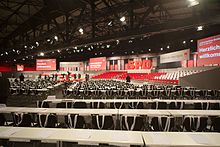
SPD Federal Party Conference 2017 in Berlin
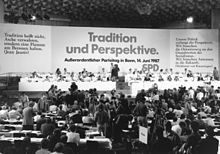
Extraordinary party congress of the SPD in Bonn on 14 June 1987. Election of Willy Brandt as honorary chairman for life.
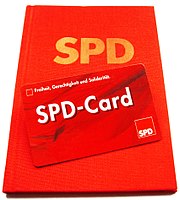
Party card of the SPD and SPD-Card (many benefits with the SPD-Card are no longer available since 2007)
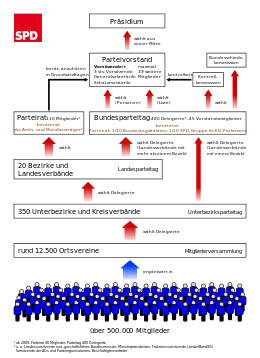
Organisational structure of the SPD
Questions and Answers
Q: What is the Social Democratic Party of Germany?
A: The Social Democratic Party of Germany, also known as SPD, is the oldest political party that still exists in Germany.
Q: When was the SPD created?
A: The SPD was created on May 23, 1863.
Q: Is the SPD one of the two most important political parties in modern-day Germany?
A: Yes, many people believe that the SPD is one of the two most important political parties in modern-day Germany, along with the Christian Democratic Union (CDU).
Q: What is the full name of the SPD?
A: The full name of the SPD is Sozialdemokratische Partei Deutschlands.
Q: What makes the SPD significant?
A: The SPD is significant because it is the oldest political party in Germany that still exists today.
Q: What are some of the core beliefs of the SPD?
A: The core beliefs of the SPD include social justice, economic equality, and democratic governance.
Q: What is the abbreviation for the SPD?
A: The abbreviation for the Social Democratic Party of Germany is SPD.
Search within the encyclopedia
.jpg)



_by_Sandro_Halank.jpg)
.jpg)

